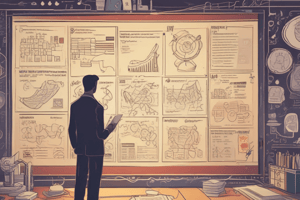Podcast
Questions and Answers
What distinguishes an effective leader from an ineffective leader?
What distinguishes an effective leader from an ineffective leader?
- Capacity to attract and motivate people (correct)
- Possession of technical skills
- The ability to manage daily tasks
- Adherence to organizational rules
What is a key characteristic that good leaders share?
What is a key characteristic that good leaders share?
- They attract capable individuals towards their vision (correct)
- They follow established plans strictly
- They avoid taking risks in decision-making
- They maintain a distance from their team
Which of these actions is considered fundamental to effective leadership?
Which of these actions is considered fundamental to effective leadership?
- Creating extensive reports for management
- Ensuring compliance with policies
- Setting high standards without support
- Motivating team members to perform their best (correct)
What is primarily emphasized as a process within leadership?
What is primarily emphasized as a process within leadership?
What aspect differentiates leadership from management?
What aspect differentiates leadership from management?
What is a primary reason leadership is described as timeless?
What is a primary reason leadership is described as timeless?
Which of the following best encapsulates the role of a leader in relation to followers?
Which of the following best encapsulates the role of a leader in relation to followers?
What is a likely outcome of effective leadership according to the chapter content?
What is a likely outcome of effective leadership according to the chapter content?
Which element is critically linked to the concept of caring leadership?
Which element is critically linked to the concept of caring leadership?
What differentiates the elements of leadership and management based on the content?
What differentiates the elements of leadership and management based on the content?
Which type of leader is characterized by their role in breaking rules and creating values?
Which type of leader is characterized by their role in breaking rules and creating values?
What has leadership evolved towards in contemporary contexts?
What has leadership evolved towards in contemporary contexts?
Which trait is least likely to correlate positively with effective leadership according to the mentioned qualities?
Which trait is least likely to correlate positively with effective leadership according to the mentioned qualities?
How has the perception of leadership differed across cultures and time periods?
How has the perception of leadership differed across cultures and time periods?
Which of the following statements about leadership traits is accurate?
Which of the following statements about leadership traits is accurate?
Flashcards are hidden until you start studying
Study Notes
What is Leadership?
- Leadership is social influence that initiates and guides change.
- Leadership is the ability to create a new direction that wouldn't exist otherwise.
- Leaders influence the behavior of others through ideas and deeds.
Why is Leadership Important?
- Leaders bring unity.
- Leadership influences social conscience and conduct.
- Leadership can shape the fate of entire nations.
Three Types of Leaders
- Teachers are rule breakers and value creators. Examples include Aristotle, Marx, Buddha, and Gandhi.
- Heroes are responsible for great causes and noble works. Examples include Galileo, Shakespeare, Einstein, and Newton.
- Rulers dominate over others and exercise power. Examples include Elizabeth the First, Julius Caesar, Washington, and Akbar.
Qualities of the Individual
- Traits linked to leadership include a strong drive for responsibility, initiative in social situations, self-confidence, and the willingness to accept consequences.
- Leadership traits have little predictive significance alone.
- Multiple leadership traits interacting create personality dynamics advantageous to those seeking leadership.
Environmental Factors
- Leadership is shaped by environment and circumstance.
- Leadership can be viewed as a social phenomenon rather than just individual traits.
- Leadership is defined differently across cultures and time periods.
Interaction between the Individual and Environment
- Leadership emerges spontaneously in social contexts.
- External circumstances and internal qualities interact to allow leaders to express their abilities.
What Do People Want in a Leader?
- People want a leader who cares, which results in others caring, becoming focused and energized, finding direction, and developing momentum.
- Caring leadership means personal commitment, concern for others, being unselfish, and service to others.
Management vs. Leadership
- Management focuses on planning, organizing, directing, and controlling.
- Leadership involves establishing direction, aligning people and resources, and energizing them to achieve results.
- Strong management without leadership can lead to the wrong things being achieved effectively.
Qualities of Successful Leadership
- Insight
- Decisiveness
- Courage
- Strength
- Resolve
- Diplomacy
Key Areas of Leadership
- Leadership Equation
- Power of Vision
- Importance of Ethics
- Empowerment of People
- Leadership Principles
- Understanding People
- Multiplying Effectiveness
- Developing Others
- Performance Management
Leadership Importance
- Leadership is a necessity to initiate and guide, bringing about change.
- Excellent leaders attract capable people, motivate them, and solve arising problems.
- Leadership is a timeless practice and it can bring unity, influence social conscience and conduct, and shape nation's fate .
Types of Leaders
- Teachers : Rule-breakers and value creators
- Heroes: Responsible for great causes and noble works.
- Rulers: Dominate over others and exercise power.
Leadership in the Future
- Leadership is moving away from autocratic, hierarchical models.
- It is becoming more participatory and empowers individuals.
Qualities of a Leader
- Leadership is viewed as a social phenomenon rather than an individual trait.
- Traits positively correlated with leadership include strong drive for responsibility, independent initiative, self-confidence, willingness to accept consequences, and influencing others.
- Individual traits hold little predictive significance.
- Multiple interacting traits generate personality dynamics advantageous to those seeking leadership roles.
Environmental Factors in Leadership
- Leadership can be forged through many forces, such as environment and circumstance
- Leadership can be defined differently by different cultures and time periods.
- Throughout history, male leaders outnumbered female leaders.
Integrity in Leadership
- It is crucial to tell the truth as a leader believes it to be.
- Leaders should have thorough job knowledge knowing which direction to take
- Leaders should have people-building skills to build winning teams.
Satisfactions and Frustrations of Leadership
- Satisfactions of leadership include feeling of power, prestige, chance to help others, high income, respect and status, opportunities for advancement, knowledge, and control of resources.
- Frustrations of leadership include excessive uncompensated work time, too many problems, not enough authority, loneliness, people problems, organizational politics and conflicting goals.
Caring Leadership
- Caring is essential for successful leadership.
- Caring leaders motivate and generate momentum in others.
- Caring leaders demonstrate personal commitment to accomplish goals, concern for others, unselfishness, and service to others.
Leadership vs Management
- Many organizations are over-managed and under-led.
- Leaders need to develop at all levels of responsibility.
- Management indicates formal authority and delegated accountability.
- Leadership is the ability to influence the activity or behavior of others.
- Strong management without leadership can lead to achieving the wrong things.
- Managers do things right and leaders do the right things.
Qualities of Successful Leadership
- Insight
- Decisiveness
- Courage
- Strength
- Resolve
- Diplomacy
Key Areas of Leadership:
- Leadership equation
- Power of vision
- Importance of ethics
- Empowerment of people
- Leadership principles
- Understanding people
- Multiplying effectiveness
- Developing others
- Performance management
Studying That Suits You
Use AI to generate personalized quizzes and flashcards to suit your learning preferences.




